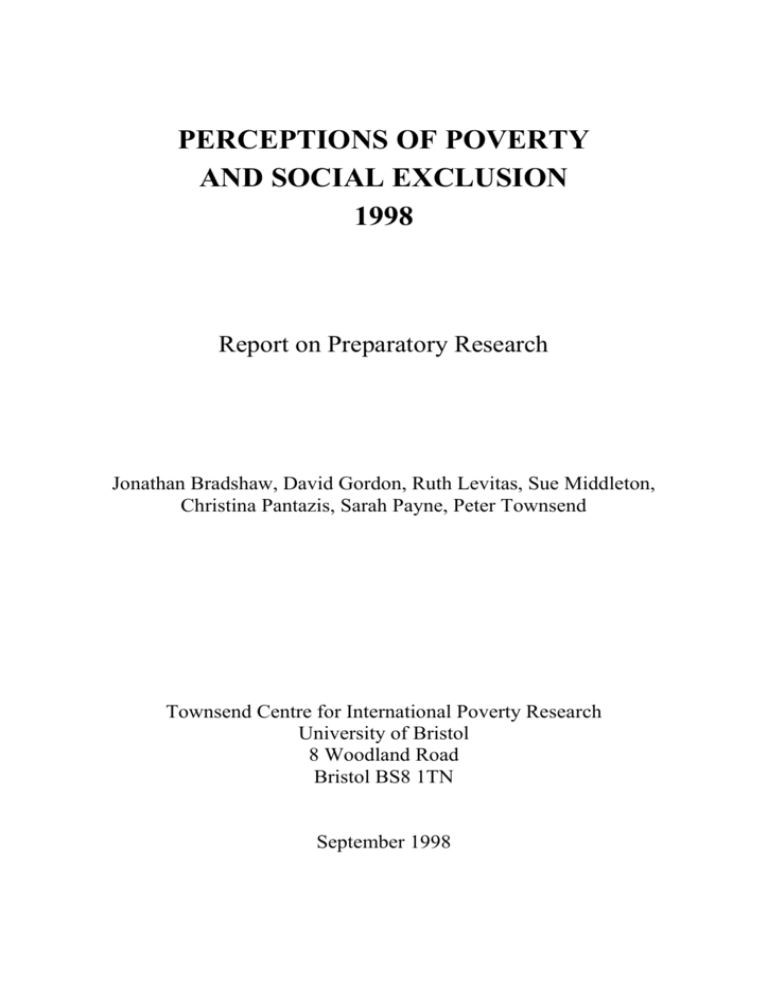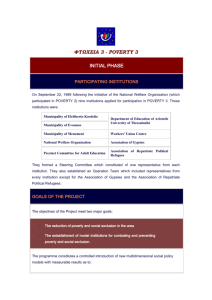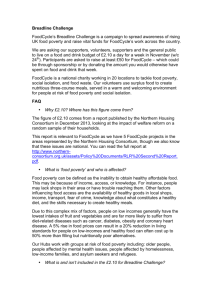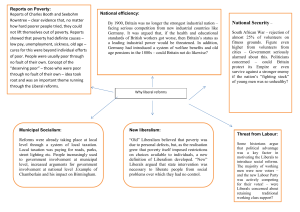DOC - University of Bristol
advertisement

PERCEPTIONS OF POVERTY AND SOCIAL EXCLUSION 1998 Report on Preparatory Research Jonathan Bradshaw, David Gordon, Ruth Levitas, Sue Middleton, Christina Pantazis, Sarah Payne, Peter Townsend Townsend Centre for International Poverty Research University of Bristol 8 Woodland Road Bristol BS8 1TN September 1998 Contents List of Contributors Acknowledgements Chapter 1 ii iii Executive Summary 1 Definitions of Concepts for the Perceptions of Poverty and Social Exclusion David Gordon 5 Chapter 2 Measuring Income in the Breadline Britain 1998 Survey David Gordon 15 Chapter 3 Gender and Poverty in the new Breadline Britain Survey Sarah Payne and Christina Pantazis 27 Chapter 4 Poverty and Mental Health in the Breadline Britain Survey Sarah Payne 31 Chapter 5 Crime and Fear of Crime Christina Pantazis 35 Chapter 6 Area Deprivation Christina Pantazis 37 Chapter 7 Social Exclusion in the New Breadline Britain Survey Ruth Levitas 39 Chapter 8 Revising the Breadline Britain Questions: Relevant Findings from the Group Discussions Sue Middleton Chapter 9 Report on the MORI Omnibus Survey Test of New Questions David Gordon and Christina Pantazis Chapter 10 Draft Questionnaire for the Survey on Poverty and Social Exclusion 43 65 81 Appendix 1: Details of the Proposed Changes to the Questionnaire and Sources for the New Questions 115 Appendix II: Showcards 121 i List of Contributors Professor Jonathan Bradshaw - Department of Social Policy and Social Work, University of York Dr David Gordon - School for Policy Studies, University of Bristol Dr Ruth Levitas - Department of Sociology, University of Bristol Dr Sue Middleton - Centre for Research in Social Policy, University of Loughborough Christina Pantazis - School for Policy Studies, University of Bristol Dr Sarah Payne - School for Policy Studies, University of Bristol Professor Peter Townsend - School for Policy Studies, University of Bristol ii Acknowledgements The Breadline Britain in the 1990s Survey was funded by London Weekend Television (LWT) with additional funding from the Joseph Rowntree Foundation and was carried out by Marketing and Opinion Research International (MORI). It was conceived and designed by Joanna Mack and Stewart Lansley for Domino Films, with the help of Brian Gosschalk of MORI. The Joseph Rowntree Foundation has supported this project as part of its programme of research and innovative development projects, which it hopes will be of value to policy makers and practitioners. The facts presented and the views expressed in this report are, however, those of the authors and not necessarily those of the Foundation. We would like to thank Barbara Ballard from the Joseph Rowntree Foundation for her advice, encouragement and support throughout this project. We would also like to thank Björn Halleröd of the University of Umeå, Tony Manners, Linda Murgatroyd and June Bowman at the Office for National Statistics, Richard Berthoud and Jonathan Gershuny at the University of Essex, Rick Davies of Swansea University, Glen Bramley of Heriot Watt University and Michael Bittman at the University of New South Wales for their helpful advice. We would also like to thank Brian Gosschalk, Mark Speed and Sarah Birtles from MORI for their helpful comments and their work on the Omnibus Questions. Helen Anderson edited, typed and formatted this report. © The Breadline Britain in the 1990s Survey is Copyright of MORI and Domino Films © The 1995 UK Time Use Survey (Module 117 Time Use) in the OPCS Omnibus is Crown Copyright iii 4 Executive Summary Background In October 1997, the JRF Work, Income and Social Policy Committee discussed a proposal for a project to replicate the Breadline Britain surveys of 1983 and 1990, the interviews for which were carried out by MORI. The committee felt that a larger sample should be used and that new indicators of deprivation and/or social exclusion needed to be developed to modernise and strengthen the research. Accordingly, a fresh proposal was drawn up by the team in three universities (Bradshaw et al, December 1997). The team undertook (i) to revisit all elements of the survey instrumentation to reflect the latest scientific thinking in preparing indicators of social exclusion as well as poverty and deprivation and, in particular, to operationalise the notions of absolute and overall poverty accepted by 117 countries after the 1995 World Summit on Social Development; (ii) to hold up to 18 group discussions in the North, Midlands and South of England to explore how people define poverty and social exclusion; develop and test new indicators of poverty and social exclusion, and test elements of the redesigned survey instrumentation; (iii) to test the newly generated indicators of poverty and social exclusion in one of the regular MORI omnibus surveys; and (iv) to pilot the new questionnaire for the survey, including the new indicators of perceived social necessities. Progress The first three of these above undertakings have been completed. These are reported below and the fourth has been prepared and discussed with MORI. A new questionnaire has been devised and is attached to this report. The team now recommends delay in conducting the pilot interviews using the full questionnaire until this can be done in conjunction with the launch of a national survey. Not all the funds made available for the preparatory research have therefore been committed. After referring extensively to survey methodologies of the 1980s and 1990s in different countries; discussing how new indicators could be incorporated into the questionnaire; examining the results of the preparatory focus group research (following the submission of a progress report in April 1998 by Sue Middleton of the Centre for Research in Social Policy, University of Loughborough) and preparing, in draft, the full questionnaire, the team agreed that piloting the full questionnaire should be combined with the national survey at the second stage of research. Approval for funds to achieve this purpose is therefore sought. The total cost of piloting the new questionnaire itself would be less in those circumstances. If funding is secured for work on the main stage, the interviewers recruited to pilot the survey questionnaire could go straight on to apply the revised national questionnaire. The team took the view that this would represent better use of total resources made available. 5 The Report on the Preparatory Stage The research team came to the following conclusions in relation to its terms of reference: (i) Reviewing concepts and especially operational definitions of poverty, deprivation and social exclusion: Two distinct lists of socially approved necessities have been drawn up - one material and one social. This fulfils the team's purpose to provide more resilient definitions of the key concepts, which can be replicated scientifically in different countries. The results of measurement have to be demonstrably valid and not hypothetical or administratively convenient. The second list has also been designed to provide criteria for the notion of social exclusion. We consider this procedure innovatory, as well as building on the European and Australian research itemised in the original proposal. In particular, the team has sought to strengthen the childhood deprivation index used in Middleton's work as a basis for measurement of poverty among children. (ii) Distinguishing "absolute" and "overall" poverty: Drawing on experimental research in Britain in 1997 (Townsend, Gordon, Bradshaw and Gosschalk, 1997) and the CRSP pilot, a set of questions designed to establish the extent of both forms of poverty in the UK and also provide the basis for wider application in other countries, has been drawn up. This is reviewed in the body of the report. Some in the team have recently obtained ESRC support to organise a series of European scientific conferences with the objective, among other things, of thrashing out a European consensus on this subject. More than 100 European social scientists have agreed to play a part in the programme. Members of the team are also seeking support for pilot research on the extent of absolute and overall poverty in Africa. (iii) Harmonising government and European methodologies: The form, scope and content of indicator questions used in the proposed questionnaire reflect successful practice in some of the major surveys in the UK and elsewhere in Europe. One important example is the European Community Household Panel. This is also intended to achieve scientific and statistical consensus in what principal methodologies should be applied in future investigations internationally as well as nationally of poverty, deprivation and social exclusion. (iv) Improving the measure of income: The design of both the questionnaire and the survey procedures have been re-modelled to give greater priority to the accuracy of the measure of income. More information is also being sought about assets, free and subsidised services and income in kind to allow the income measure to be broadened and checked. As discussed in the body of the report, the income bands currently used as standard in the UK Office of National Statistics surveys have been adopted for purposes of comparability. (v) Adapting the 1983 and 1990 methodologies to 1998: The team point out that modernisation of survey method is difficult to reconcile with reliable measurement of trends. For example, context can influence answers to single questions, even when these questions are identical with those put in previous 6 years. However, the problem is a familiar one to statisticians (for example in distinguishing economic growth from inflation) and the team has drawn up a questionnaire which deliberately reproduces the "continuity" questions in the early stages of the interview and keeps them together in a form as representative as possible of the 1983 and 1990 predecessors. (vi) Changing the Breadline Britain questionnaire: The 1983 Breadline Britain study pioneered the 'consensual' or 'perceived deprivation' approach to measuring poverty which has since been widely adopted by other studies both in Britain and abroad. The results from the last survey in 1990 are now becoming dated, hence the need for a new survey to provide baseline data on the extent of poverty in Britain. The research team have decided to retain the basic structure of the 1990 Breadline Britain questionnaire but also make a number of significant improvements. Specifically, they will: 1. develop and test out new ways of identifying those experiencing exclusion from the life of society due to lack of resources, including necessities designed to represent better the notion of social exclusion. 2. revise the questions on the lifestyles and living standards of children. 3. operationalise the notions of absolute and overall poverty accepted by 117 countries after the 1995 World Summit on Social Development. 4. adopt the Office of National Statistics harmonised question wordings where appropriate. 5. drop the questions that do not work and add some of the deprivation questions from the European Community Household Panel Survey. 6. improve the income questions. None of these changes will prevent the survey results being compared with those from other countries or the earlier Breadline Britain surveys. The full report sets out the reasons for the conclusions reached. 7





